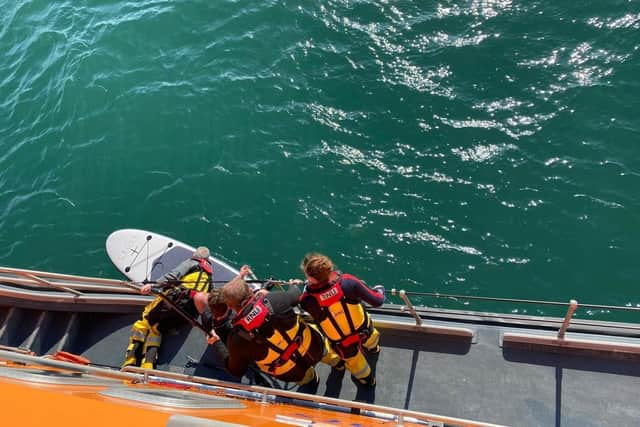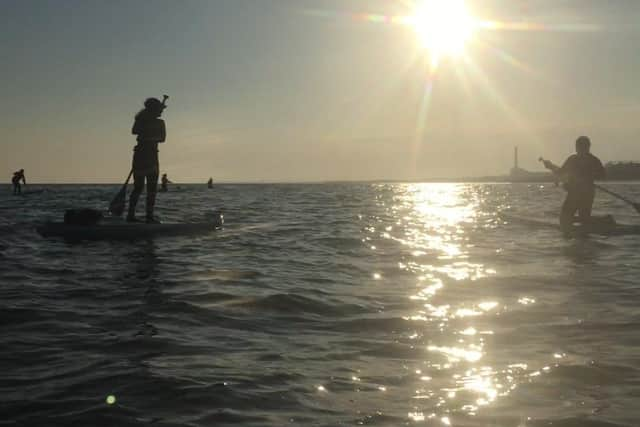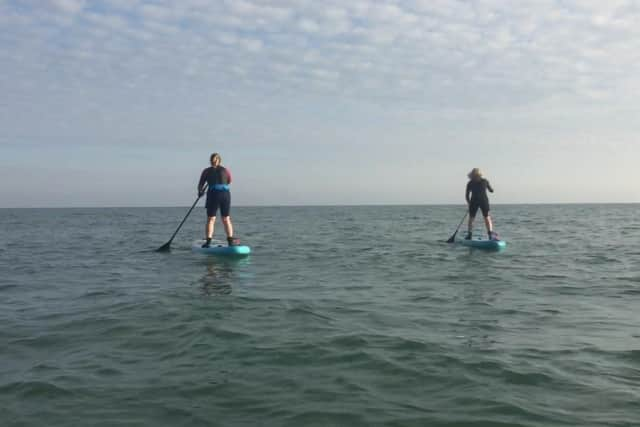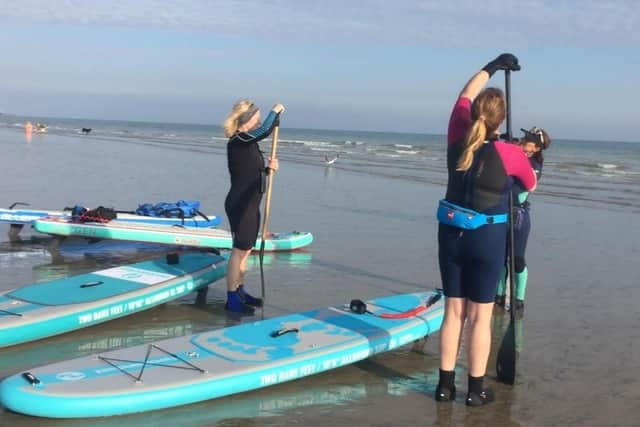Paddleboard novices urged to seek advice after callouts
and live on Freeview channel 276
Stand up paddleboarding, or SUP, is one sport which ‘surged’ in popularity following the various lockdowns and continues to be a well-loved pastime, according to local instructors.
Similar paddle sports, including kayaking, have also seen increased interest.
Advertisement
Hide AdAdvertisement
Hide Ad“In 2020 I saw a real boom in paddleboarding,” said Sasha Chisholm, a local SUP instructor and founder of Moxie Unleashed.


“Everyone was on furlough so there were a lot of people at home and a lot of interest,” she added.
Despite her extensive paddleboarding knowledge, Sasha says she avoided SUP in lockdown because she did not want to encourage others who may not ‘know the conditions or be that experienced’.
“Emergency callouts could have put pressure on the NHS and emergency services,” she said.
Advertisement
Hide AdAdvertisement
Hide AdGraham Easton is a senior coastal operations officer for HM Coastguard in Newhaven and said the staycation boom saw an increase in water users and also callouts.


“Coastguard rescue teams have probably been out to more [paddleboarders] than in previous years,” he said.
“With the restriction in overseas travel, lots of people spent more time on British beaches.
“Clearly they’re looking for something to do and stand up paddleboarding has increased in popularity.”
Advertisement
Hide AdAdvertisement
Hide AdHe said SUP boarding is a ‘good way to get into watersports’ but warns those who ‘may not fully understand some of the dangers or risks of being in the sea’.


Consequences of being caught out can be deadly
The RNLI and HM Coastguard have urged novices and experts alike to stay safe by buying the right equipment and paying attention to changeable wind and weather conditions which could catch them out.
This follows a number of incidents where paddleboarders, kayakers and people using inflatables have had to be rescued.
In November 2021, four paddleboarders died at the River Cleddau in Haverfordwest, Wales. They were part of a group of nine who encountered problems when exploring the river. Their trip took place just a day after heavy rain and when a flood alert was in place for western Cleddau.


RNLI has ‘unprecedented’ summer for callouts
Advertisement
Hide AdAdvertisement
Hide AdIn 2020 the RNLI saw an ‘unprecedented’ summer with a 64 per cent increase in callouts compared to 2019.
Across the South East, the RNLI was called out 48 times to kayakers and 30 times to paddleboarders alone. This accounted for about three per cent of lifeboat launches in the region and the actual figure is likely to be higher when coastguard callouts are included.
This shows a marked increase in RNLI callouts to SUP boards as there were just eight launches in 2019.
In April 2021, a young paddleboarder had to be rescued by the RNLI in Seaford, despite moderate sea conditions.
Advertisement
Hide AdAdvertisement
Hide AdThe boy’s mother alerted the RNLI after growing concerned for his wellbeing.


When the RNLI found the boy, he was still on his board but he was struggling to get back to shore - The tide had taken him further out to sea where the wind was stronger.
Nick Gentry, an RNLI navigator, said: “Keeping an eye on a friend or family member who is involved in any water activity, can help save a life - The casualty’s mother did the right thing.”
Examples of water users being caught out - and not just paddleboarders - are also well documented in the BBC documentary ‘Saving Lives at Sea’. It follows RNLI crews up and down the country as they respond to challenging emergencies.
How to SUP safely
Advertisement
Hide AdAdvertisement
Hide AdRoger Cohen MBE is an RNLI operations manager and volunteer of 38 years in Brighton and Newhaven. Not only does Roger ensure the safety of the public, but he also takes care of lifeboat crews and equipment.
He has been an avid paddleboarder for around six years and encourages newbies to get the right kit.
“If you buy a board, you have got to buy a leash as well,” he said.
“A leash will keep you connected to the board and this is important for those in the first part of their ‘SUPping career’ who will be falling off.”
Advertisement
Hide AdAdvertisement
Hide AdHe also encourages watersports enthusiasts to ‘beware the weather conditions’ and recommends that they take a phone in a waterproof pouch with them.
“You should also mark your board with a contact number and - most importantly - wear a life jacket,” he added.
Graham Easton has also given advice to those who are new to the sport.
“We are seeing more people buy these stand up paddleboards, and I would always encourage people to get some sort of training before stepping out on the water,” he said.
Advertisement
Hide AdAdvertisement
Hide AdThose who do take Graham’s advice and get SUP lessons are advised to look for fully qualified instructors like Moxie Unleashed founder Sasha.
The British Stand Up Paddle Association (BSUPA) is one organisation providing training and qualifications for instructors.
Cold water shock can take your breath away, says Graham, and he urges water users to wear a buoyancy aid or life jacket.
“The British coastline, even in the height of summer, is classed as cold,” he said.
Advertisement
Hide AdAdvertisement
Hide Ad“When paddleboarding, you’re not in the water as such but I think you need to assume that, at some stage, you will go into the water.”
It is also vital that paddleboarders check weather, wind and tide conditions before stepping out.
“Wind and tides are profoundly powerful - If you get the tide wrong it could take you out to sea; if the wind is blowing in the wrong direction it could also take you out to sea,” Graham added.
“It’s different every time you go in, so do some research and don’t get caught out.”